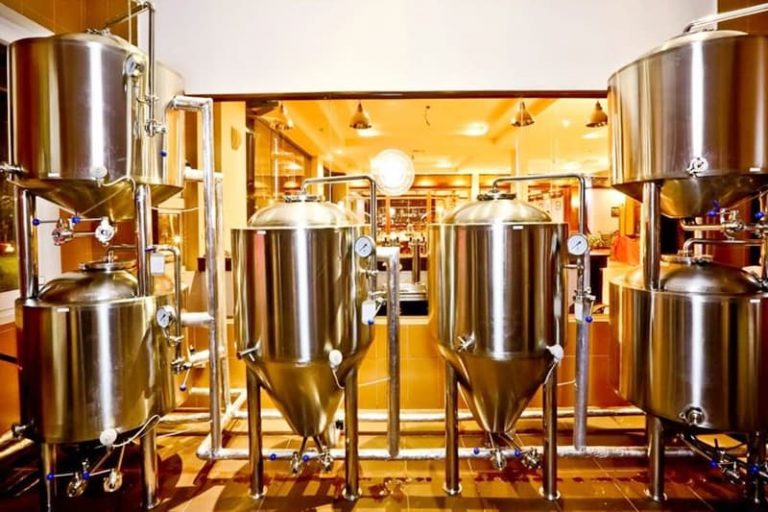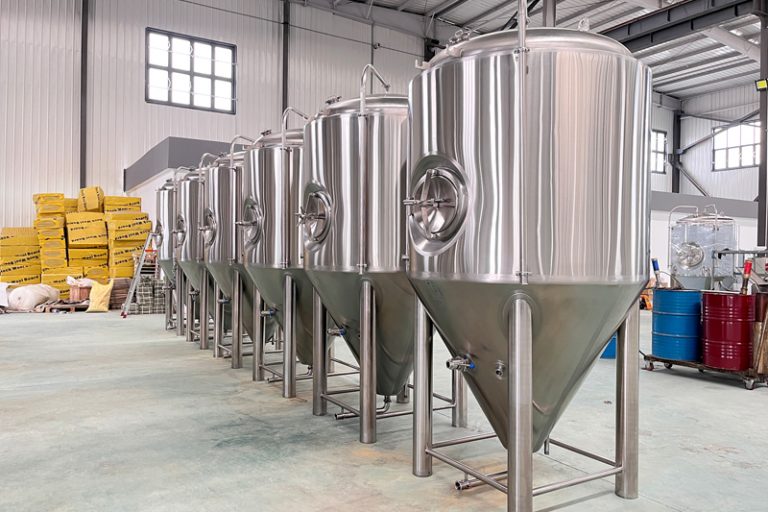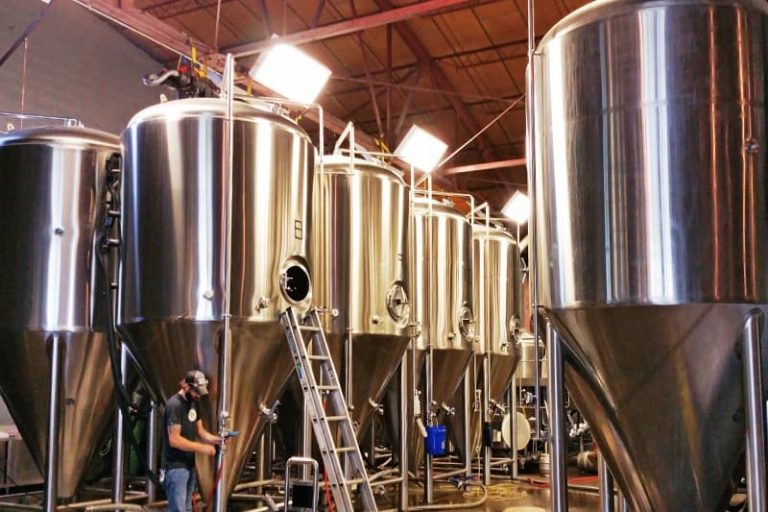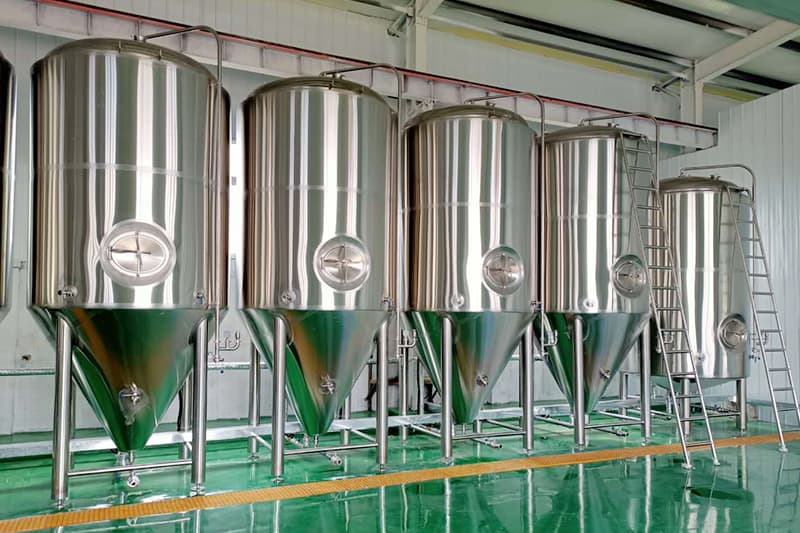Fermentation tanks are widely used equipment in modern industrial production, especially in the fields of food, beverages, pharmaceuticals, and bioengineering. Choosing the right stainless steel fermentation tank has a direct impact on production efficiency and product quality, and a far-reaching impact on the long-term development of the enterprise.
What is a stainless steel fermentation tank?
A stainless steel fermentation tank, as the name implies, is a container made of stainless steel for biological fermentation. Fermentation refers to a process in which microorganisms produce energy by decomposing organic matter under anaerobic or limited oxygen conditions. In this process, the fermentation tank, as the core equipment of the reaction, provides an environment suitable for the growth and metabolism of microorganisms. Since the fermentation process involves high temperature, acid-base environment, gas exchange, and the growth and reproduction of microorganisms, the material and design requirements of the fermentation tank are extremely strict. Traditional fermentation tanks are mostly made of wood, glass, or ceramics, but stainless steel has become the preferred material for modern fermentation tanks due to its corrosion resistance, high temperature resistance, easy cleaning, and maintenance.
The main function of a stainless steel fermentation tank is to provide a closed, corrosion-resistant environment that can be gas and temperature controlled to ensure that microorganisms can ferment under optimal conditions. Common applications include the production of fermented products such as wine, dairy products, soy sauce, yogurt, beer, and medicines.

Types of stainless steel fermenters
Single tank fermenters
Single-tank fermenters are the most basic fermentation equipment, usually suitable for small laboratories or small batch production. They are characterized by small size, simple structure, and easy use. They are suitable for cultivating microorganisms for small-scale fermentation operations.
2-tank fermentation system
The 2-tank fermentation system generally consists of a main fermentation tank and a pretreatment tank (or auxiliary tank). This structure is designed mainly to improve production efficiency and stability. The auxiliary tank can be used for pretreatment of raw materials, gas mixing, nutrient supplementation, etc., while the main fermentation tank performs the core fermentation process. The 2-tank fermentation system is often used for large-scale industrial production.
High-pressure fermentation tank
A high-pressure fermentation tank is an improvement on a conventional fermentation tank, which has higher pressure resistance. This type of fermentation tank is widely used in microbial cultivation that requires a high-pressure environment, such as gas fermentation, anaerobic fermentation, etc. The structure of the high-pressure fermentation tank is complex, requiring higher sealing and high-pressure resistance.
Continuous fermentation tanks
Continuous fermentation tanks are usually used in scenarios that require continuous production, such as alcohol fermentation and the production of certain drugs. Continuous fermentation is different from batch fermentation. The latter is carried out in batches, while the former is carried out continuously under certain conditions and often needs to be matched with external equipment, such as a liquid supply system, an exhaust system, etc.

Tips for choosing stainless steel fermentation tanks
Consider the choice of materials
The materials of stainless steel fermentation tanks are mainly 304 stainless steel and 316L stainless steel. 304 stainless steel has good corrosion resistance and easy cleaning, suitable for most conventional fermentation applications; while 316L stainless steel has stronger corrosion resistance, especially suitable for fermentation processes in acidic and alkaline environments or high-salt environments. When choosing materials, you should judge according to the nature of the raw materials used in the fermentation process, the pH value, and the cleaning requirements.
Capacity and scale selection
When choosing a stainless steel fermenter, capacity is an important consideration. For small-scale laboratory research, a smaller capacity fermenter can meet the needs; for large-scale industrial production, a larger volume fermenter is usually required. When choosing, the appropriate capacity should be determined based on the needs of the production batch, the production cycle, and the market demand of the product.
Temperature control system and gas control
Temperature and gas control are key factors in the fermentation process. A suitable temperature control system can ensure that the fermentation reaction is carried out at the optimal temperature to avoid excessively high or low temperatures that affect the growth of microorganisms. The gas control system is used to adjust the concentration of gases in the tank, such as oxygen, carbon dioxide, etc. When choosing, you should ensure that the fermentation tank is equipped with advanced temperature control and gas control equipment to ensure the stability of the fermentation process.
Mixing and stirring system
Many fermentation processes require effective mixing and stirring to ensure uniform distribution of the reactants. The design of the mixing and stirring system is crucial, as it can effectively improve fermentation efficiency, promote microbial growth, ensure dissolved oxygen, etc. Different types of stirring systems, such as mechanical stirring and gas stirring, have different advantages and disadvantages. The choice should be determined based on the fermentation type, stirring requirements, and microbial species.
Cleaning and disinfection
Cleaning and disinfection of stainless steel fermentation tanks are the key to ensuring production hygiene and safety. When selecting a fermentation tank, you should consider how easy it is to clean, whether it is equipped with an automatic cleaning system (CIP system), and whether it can effectively remove residues and microorganisms to avoid contamination of the next batch of fermentation.
Sealing and pressure bearing capacity
The sealing of the fermentation tank directly affects the gas exchange and internal environment stability during the fermentation process. Good sealing can prevent gas leakage, reduce pollution sources, and help maintain the stability of the fermentation process. At the same time, for some special fermentation processes (such as anaerobic fermentation), the pressure-bearing capacity of the fermentation tank is particularly important.
Automatic control and monitoring system
As industrial production has higher and higher requirements for efficiency and accuracy, automatic control systems have become standard for modern fermentation tanks. Efficient automatic control systems can monitor temperature, pressure, pH value, dissolved oxygen, and other parameters in real time during the fermentation process, automatically adjust relevant parameters, avoid human operation errors, and ensure the smooth progress of the fermentation process.
Manufacturer's technical support and after-sales service
When choosing a stainless steel fermentation tank, you also need to consider the manufacturer’s technical support and after-sales service. An experienced supplier can not only provide high-quality equipment, but also provide you with subsequent maintenance, technical support, and training services. This is especially important for manufacturers who use fermentation tanks for a long time.

FAQ
What are the main uses of stainless steel fermentation tanks?
Stainless steel fermentation tanks are mainly used in the fermentation process in the food, beverage, pharmaceutical, and other industries. It provides a suitable environment for microorganisms to carry out fermentation reactions, such as the production of wine, beer, yogurt, soy sauce, medicines, etc. Due to its corrosion resistance, easy cleaning, and high temperature resistance, stainless steel fermentation tanks have become the preferred equipment for modern industrial fermentation.
Are stainless steel fermentation tanks prone to corrosion?
Although stainless steel has good corrosion resistance, fermentation tanks may still corrode in certain special environments, especially in strong acid or alkali environments, long-term high temperatures, or high salt environments. To prevent corrosion, you can choose stainless steel materials with stronger corrosion resistance, such as 316L, and passivate them. At the same time, check and clean the fermentation tank regularly to avoid the accumulation of corrosive substances.
How to maintain the sealing of stainless steel fermentation tanks?
To maintain the good sealing of the fermentation tank, the sealing parts (such as the tank cover, exhaust valve, air inlet, etc.) should be checked regularly to ensure that there is no aging, damage, or leakage. Use high-quality sealing materials such as rubber gaskets or silicone sealing strips to ensure the sealing effect. In addition, replace the seals regularly to avoid problems during long-term use.
How to ensure the stability of the temperature control system?
To ensure the stability of the temperature control system, the temperature control equipment should be calibrated regularly to check the working status of the temperature sensor, heating device, and thermostat. Clean the temperature control equipment to avoid temperature fluctuations due to scale or malfunction. Ensure that the temperature control system has accuracy and response speed to cope with temperature changes during the fermentation process.
What should I do if biofilm appears on the inner surface of the fermentation tank?
The inner surface of the fermentation tank may accumulate biofilm due to long-term use, affecting the fermentation effect and equipment hygiene. Regularly use special cleaning agents for cleaning and disinfection to completely remove the biofilm on the inner wall. Equipped with an automatic cleaning system (CIP) can effectively improve cleaning efficiency and reduce biofilm accumulation.
How to clean and disinfect stainless steel fermentation tanks?
Cleaning and disinfection of stainless steel fermentation tanks requires the use of detergents and disinfectants that meet food hygiene standards. Clean and disinfect regularly, especially after each fermentation, to prevent cross-contamination. Equipped with an automatic cleaning system (CIP) can improve the cleaning effect and ensure a clean and hygienic environment inside the fermentation tank.


